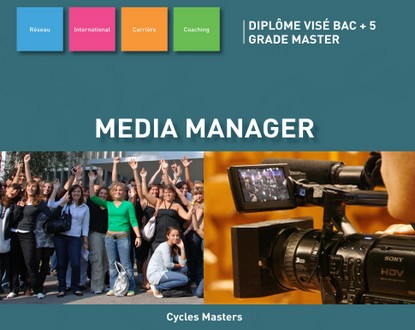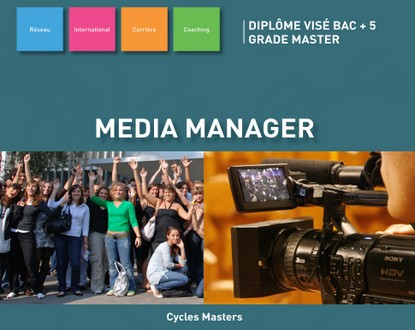A small revolution in the world of business schools. IPAG Nice, which has just secured the Master’s Degree, is launching into media training by offering, starting in the 2012 academic year, a two-year Master’s in Media Management to students eager to enter the world of media, information, and communication. A theoretical and technical curriculum tailored to the current needs of the rapidly evolving information and communication market.
 This Master’s program will therefore be offered in Nice in the upcoming 2012 academic year at IPAG, which will transform a part of its building into a true multimedia studio, equipped with a video and audio recording studio, an editorial room, and a computer and editing room. This is a novelty for this business school, which excelled until now in the fields of communication marketing and finance. More than just a novelty, it is an additional asset to the training offered by IPAG since the project initiators quickly found the “natural” link between media and marketing or between information and the economy.
This Master’s program will therefore be offered in Nice in the upcoming 2012 academic year at IPAG, which will transform a part of its building into a true multimedia studio, equipped with a video and audio recording studio, an editorial room, and a computer and editing room. This is a novelty for this business school, which excelled until now in the fields of communication marketing and finance. More than just a novelty, it is an additional asset to the training offered by IPAG since the project initiators quickly found the “natural” link between media and marketing or between information and the economy.
In an era where one must be as fast as the news, this training will be supported by providing students with a true multimedia platform, consisting of an online daily, a Web TV, and a Web radio. This platform will enable them to evolve under real conditions during media training sessions or event coverage. It is therefore only natural that Nice Premium will become, from the 2012 academic year, the privileged partner of the Master in Media Management by providing IPAG with its multimedia platform and especially its preferred listing with Google News – the world’s leading online news source – in which the students’ work will be immediately indexed. Articles, reports, programs, and radio and TV news will be the daily routine for the editorial teams composed of Master 1 and Master 2 students. Extracurricular thematic clubs will allow the most curious, enthusiastic, and creative among them to imagine and design projects and new concepts, which will then be broadcast on the Master’s various media.
Technological advancements and the new economic challenges of the media today require information professionals to master skills formerly reserved for communication and management professions. The traditional qualities required (quality of expression, general culture, interest in the news, ethics) obviously remain a prerequisite for success in the field. The use of the web and social networks by businesses and public organizations, and the multiple audiences they must now address, demand communication professionals to master techniques that are at the core of journalistic practice: research and validation of information, defining an editorial policy for their communication supports, writing quality, and mastery of multimedia techniques: Print, web, audio, and video.
This is why IPAG has created the Master in Media Management: a comprehensive and professionalizing training covering both the editorial, economic, technical, and marketing aspects of the new media of information and communication.
Thus, the students trained in this Master’s program will benefit from a dual skill set that will allow them to orient themselves either towards information professions, or towards communication professions, and in all cases towards management roles of these new, technologically intensive media.
Interview with Philippe Dorey
Director of IPAG Nice
A Master’s in Media Management in a business school, that’s a first, isn’t it?
It is indeed a first, and it seemed evident to us. Today we are witnessing an incredible convergence of skills between the information and communication professions. Web journalists need skills in management and administration, and communication managers in companies or agencies must acquire editorial skills. They all need an excellent understanding of technology.
What will be the main themes of these two years of the Master’s program?
It is a generalist and professionalizing program. In Master 1, we will focus on management, communication, and content production across different media. In Master 2, we will delve into new business models, production, editing, and data journalism. Throughout the two years, students will work on a multimedia platform, including an online daily, a web television, and a web radio where they can publish their work. We are delighted that this can be done in collaboration with Nice Premium.
Finally, and because it is the heart of the training, what career opportunities are there after this curriculum?
They will be able to go into information careers, such as editor-in-chief of an online newspaper, web radio, or web TV, or become a producer of new media content. Or they could move towards communication in agencies, companies, or local governments and become responsible for internal multimedia publications, community manager for large companies, or multimedia communication officer.



